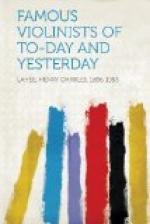When she appeared in London, in 1898, she surprised and delighted the audience, displaying a fine tone, natural musical feeling, and complete technique. Few violinists can play with such quiet, intense sentiment. Miss Jackson, though but twenty years of age, is already a veteran concert player, for she has appeared in many cities of Europe, and was already known in America before she went to Berlin. She played in July, 1899, before the Queen of England at Windsor Castle, and again in August at Osborne House, in the Isle of Wight.
The time has long since gone by when mere showy technique would earn a reputation for any violinist, male or female, and she who expects to be numbered with the great violinists must be first of all a musician, capable of interpreting the greatest works. If in addition to this she has “the divine spark,” she will be truly great.
CHAPTER XI.
FAMOUS QUARTETS.
Quartet playing is at once the delight and the despair of the amateur, who finds no greater pleasure than an evening spent in endeavouring to unravel the intricacies of chamber music, nor any keener disappointment than the realisation that it is capable of far better interpretation.
For the professional there are many influences which cause him to hesitate before he launches forth upon the quicksands of public performance. The first necessity in professional quartet playing is the devotion of a large amount of time to the acquisition of a perfect ensemble. A quartet may be likened unto a family, in which the members learn to know one another by being brought up together, and few are the professionals who can sacrifice the time necessary for the acquisition of this perfect ensemble.
Apparently very little was done previous to the nineteenth century in the way of quartet concerts, but Baillot founded a series of quartet concerts in Paris, which were highly spoken of, and about the same time Schuppanzigh, an excellent violinist and teacher in Vienna, established a quartet which became famous. In this quartet Mayseder played, in his younger days, second violin. Mayseder was considered the foremost violinist in Vienna, but he never travelled as a virtuoso.
When Spohr went first to Leipzig and was unknown, he had to find a way by which he could attract attention to himself,—in those days the advertising agent was not much in evidence,—so that he might give a concert with a reasonable prospect of success. The rich merchants, to whom he had brought letters of introduction, knew nothing of him and received him coldly. “I was very anxious to be invited to play at one of their music parties in order to draw attention to myself,” Spohr says in his autobiography, “and my wish was fulfilled, for I was invited to a grand party and asked to play something. I chose one of the loveliest of the six new quartets of Beethoven, with which I had often charmed my hearers in Brunswick. But




